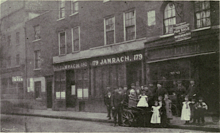Charles Jamrach
Charles Jamrach (born Johann Christian Carl Jamrach; March 1815 – 6 September 1891) was a leading dealer in wildlife, birds and shells in 19th-century London. He owned an exotic pet store on the Ratcliffe Highway in east London — at the time the largest such shop in the world. Jamrach's nearest rival was Edward Cross, who ran a menagerie at Exeter Exchange on the Strand.

Jamrach was born in Germany (either in Hamburg or Memel). His father, Johann Gottlieb Jamrach, was chief of the Hamburg river police (the Wasserschutzpolizei), whose contacts with sailors enabled him to build up a trade as a dealer in birds and wild animals, establishing branches in Antwerp and London.
Charles Jamrach moved to London and took over that branch of the business after his father's death in circa 1840. He became a leading importer, breeder, and exporter of animals, selling to noblemen, zoos, menageries and circus owners, and buying from ships docking in London and nearby ports, with agents in other major British ports, including Liverpool, Southampton and Plymouth, and also in continental Europe. His business included a shop and a museum — named Jamrach's Animal Emporium — on the Ratcliffe Highway and a menagerie in Betts Street, both in the East End, and a warehouse in Old Gravel Lane, Southwark.
After a Bengal tiger escaped from its box at the Emporium in 1857, and picked up and carried off a passing eight- or nine-year-old boy, Jamrach "came running up and, thrusting his bare hands into the tiger's throat, forced the beast to let his captive go". The boy, who had approached and tried to pet the animal having never seen such a big cat before, sued Jamrach and was awarded £300 in damages. The tiger was sold to George Wombwell and became a popular attraction at his menagerie. The tiger's escape, and subsequent rescue, are commemorated by a bronze statue near the entrance to Tobacco Dock, a short distance from the scene of the incident.
Jamrach was also largely responsible for restocking P. T. Barnum's circus after a fire in 1864.
A sea snail, Amoria jamrachi, was named after Jamrach by John Edward Gray, keeper of zoology at the British Museum, to whom Jamrach had forwarded the shell after he obtained it.
Jamrach was married three times, first to Mary Athanasio; then to Ellen Downing; and finally to Clara Salter. Two of his sons, William and Albert, also became dealers in wildlife. Jamrach died in Bow on 6 September 1891. The business prospered for some time, but encountered difficulties during the First World War. After Albert died in 1917, the firm went out of business in 1919.
Portrayals in fiction
Jamrach is mentioned briefly in Bram Stoker's Dracula as the provider of a grey Norwegian wolf to the London Zoological Gardens, which subsequently escapes. Stoker also mentions Jamrach, perhaps even more briefly, in his last novel, The Lair of the White Worm. He was featured in Carol Birch's 2011 novel Jamrach's Menagerie, which was long-listed for the Orange Prize and short-listed for the Man Booker Prize.
Jamrach's Menagerie was also featured in several episodes of the sixth season of the TV drama Ripper Street (2016).
Mentioned by Saki (H. H. Munro) in the short story "Reginald's Drama": "It would look so well on the programmes, 'Wolves in the first act, by Jamrach.'"
References
- Brenda Assael, ‘Jamrach, Charles (1815–1891)’, Oxford Dictionary of National Biography, Oxford University Press, 2004 accessed 21 June 2011
- "My struggle with a tiger", from The Boy's Own Paper, Vol. I, no. 3 (1 February 1879)
- Tiger and Boy, Public Monument and Sculpture Association
- Good Words, 1879, Victorian London
- Mr Jamrach's college for young beasts, The Leisure Hour, Volume 7, (no.338, 17 June 1858), p. 377-380
- Front page of Saturday, 1 February 1879 edition of newspaper The Boy's Own Paper
External links
Detailed description of Jamrach's business in the East End, by a Victorian clergyman who admired it.